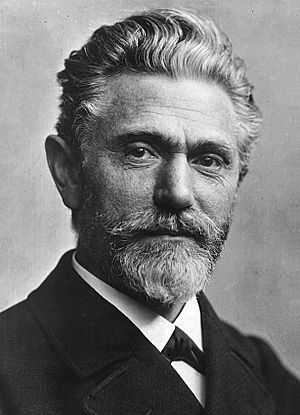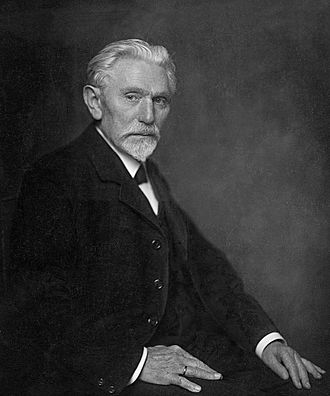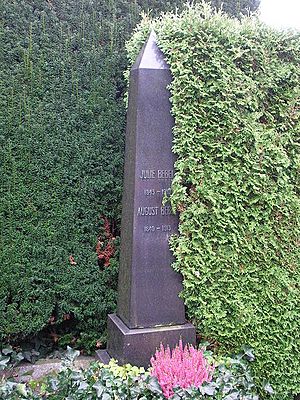August Bebel facts for kids
Quick facts for kids
August Bebel
|
|
|---|---|

Bebel, c. 1900
|
|
| Chairman of the Social Democratic Party of Germany | |
| In office 21 November 1892 – 13 August 1913 |
|
| Preceded by |
|
| Succeeded by | |
| Member of the Reichstag (German Empire) |
|
| In office 21 March 1871 – 13 August 1913 |
|
| (North German Confederation) | |
| In office 10 September 1867 – 10 December 1870 |
|
| Personal details | |
| Born |
Ferdinand August Bebel
22 February 1840 Deutz (Cologne), Rhine Province, Kingdom of Prussia |
| Died | 13 August 1913 (aged 73) Passug, Churwalden, Switzerland |
| Political party |
|
| Other political affiliations |
First International |
| Profession | Turner |
Ferdinand August Bebel (born February 22, 1840 – died August 13, 1913) was an important German politician, writer, and speaker. He is best known for helping to start the Social Democratic Workers' Party of Germany (SDAP) in 1869. This party later joined with another group in 1875 to form the Socialist Workers' Party of Germany (SAPD). In 1890, it became the Social Democratic Party of Germany (SPD). Bebel became a key leader of the social democratic movement in Germany, especially when laws were made against socialists. From 1892 until he died, he was the chairman of the Social Democratic Party of Germany.
Contents
About August Bebel
Early Life and Work
Ferdinand August Bebel, often called August, was born on February 22, 1840, in Deutz, Germany. This area is now part of Cologne. His father was a soldier in the Prussian army. Sadly, his father passed away in 1844 when August was very young.
As a teenager, Bebel learned to be a carpenter and joiner in Leipzig. Like many workers in Germany at that time, he traveled a lot to find jobs. This helped him see firsthand the challenges and difficulties that working people faced every day.
In 1860, he settled in Leipzig and became a master turner, making things like horn buttons. He joined different groups for workers. At first, Bebel was not interested in socialism. But he slowly started to believe in socialist ideas after reading pamphlets by Ferdinand Lassalle. These writings helped explain the ideas of Karl Marx in a simple way. In 1865, he met Wilhelm Liebknecht and became fully dedicated to the socialist cause. He joined the First International in 1866.
August Bebel's Political Journey
After another socialist leader, Lassalle, died, Bebel was part of a group that chose not to follow the new party leader. This happened at a meeting in 1867. Bebel and Liebknecht then started the Sächsische Volkspartei (Saxon People's Party). Bebel also led the Union of German Workers' Associations from 1867 and was a member of the First International.
In the same year, Bebel was elected to the North German Reichstag. The Reichstag was like the parliament or main law-making body. He represented the region of Saxony.
In 1869, he helped create the Social Democratic Workers' Party of Germany (SDAP). This party later joined with another group in 1875 to form the Socialist Workers' Party of Germany (SAPD). This party then became the Social Democratic Party of Germany (SPD) in 1890.
Bebel was very good at organizing and speaking. This quickly made him one of the main leaders of the socialists. He became their chief spokesperson in parliament. He remained a member of the German parliament, called the Reichstag, until he died. He represented different areas over the years. Later in his life, he became the chairman of the SPD. He strongly believed in Marx's ideas, which sometimes caused disagreements with other parts of his party.
In 1870, he spoke in parliament against continuing the war with France. Bebel and Liebknecht were the only members who did not vote for extra money needed for the war. Bebel was one of only two socialists elected to the Reichstag in 1871. He used his position to speak out against Germany taking over Alsace-Lorraine. He also showed support for the Paris Commune, a revolutionary government in Paris. The German leader, Otto von Bismarck, later said that Bebel's speech showed him that socialism was an enemy he needed to fight.
Bebel and Liebknecht were arrested because they were accused of working with the French. They were said to be part of a plan to free French prisoners of war in Germany. However, there was no proof for these serious accusations.
Since the government didn't want to let go of such important opponents of the war, Bebel and Liebknecht were charged with other things in 1872. They were found guilty and sent to prison for two years. This time was spent at the famous Königstein Fortress. Bebel also received an extra nine months in prison for speaking against the German emperor. Being in prison actually made Bebel more respected among his party members and the public who supported him.
In 1874, Bebel started a small button factory. He worked as a salesman for it. But in 1889, he stopped his business to focus completely on politics. He also worked for socialist newspapers like Volksstaat (The People's State) and later Vorwärts (Forward).
After he was released from prison, he helped organize the united Social Democrats party at a meeting in Gotha. Even when laws were passed against socialists, he continued to be very active in the Reichstag debates. He was also elected to the Saxon parliament. When a special state of emergency was declared in Leipzig, he was forced to leave the city. In 1886, he was sent to prison for nine months for being part of a secret group.
In party meetings in 1890 and 1891, some of Bebel's ideas were strongly criticized. First, some young socialists wanted to stop working through parliament. Bebel won this argument. On the other side, he disagreed with another group who wanted to achieve socialist goals slowly, rather than through a complete change of society. This disagreement continued, and Bebel became known as the main supporter of the traditional Marxist views. Even though he was against war, he said that if other countries attacked Germany, socialists would not help them or stay neutral. In 1911, as tensions grew between European countries, Bebel famously predicted a coming "great war" with millions of soldiers. He said it would be followed by a "great collapse," with widespread poverty and unemployment.
In 1899, at a meeting in Hanover, Bebel gave a speech criticizing Eduard Bernstein's ideas, which suggested changing some core socialist beliefs. Bebel's ideas were supported by most of the people at the meeting.
Fighting for Fairness and Rights
Bebel was especially known for speaking out against soldiers being treated badly by their officers. His efforts were encouraged when the King of Saxony issued a rule about treating soldiers fairly. This made it harder for the government to ignore the problems Bebel brought up.
Speaking in the Reichstag, Bebel also criticized the war to stop the Boxer Rebellion in China in 1900.
Bebel is also famous for being very upset about how Germans treated native people in German South-West Africa. He was particularly concerned about the Herero nation. In 1904, after the Herero people fought back against German officials and soldiers, a German general started a very cruel "war of extermination" against them. Bebel and the German Social Democratic Party were the only ones in the Reichstag who spoke against spending more money on this colonial war. In a speech in March 1904, Bebel called the policy in German South-West Africa "not only cruel, but very wrong." Some newspapers at the time made fun of Bebel for this. But Bebel did not stop. He continued to warn against harmful ideas about some races being better than others.
Bebel wrote a book called Women and Socialism. In this book, he discussed how society could be more fair for women. He believed that religion should be a "private matter," meaning that the SPD party should not take a side on religious questions. He thought people should be free to choose their own beliefs. Bebel saw himself as both a patriot (someone who loves their country) and an internationalist (someone who believes in cooperation between nations). He felt these two ideas could work together.
Death and Lasting Impact
August Bebel passed away on August 13, 1913, from a heart attack. He was visiting a health resort in Passugg, Switzerland, and was 73 years old. He was buried in Zürich.
After his death, Vladimir Lenin, a famous Russian Marxist leader, praised Bebel. He called him a "model workers' leader" who showed how an ordinary worker could become a political leader fighting for a "better social system."
A well-known saying, "Anti-Semitism is the socialism of fools," is often linked to Bebel. This saying means that hating Jewish people is a foolish idea that has nothing to do with true socialism.
August Bebel's legacy was honored by East Germany (the German Democratic Republic). They named a public square and several streets after him. Stamps with his picture were also made.
English Books by August Bebel
- Women in the Past, Present, and Future (1885)
- Assassinations and Socialism (1899)
- Women Under Socialism (1904)
- Trade Unions and Political Parties (1906)
- Bebel's Reminiscences (1911)
- The Intellectual Ability of Women (c. 1912)
- My Life (1912)
- Speeches of August Bebel (1928)
See also
 In Spanish: August Bebel para niños
In Spanish: August Bebel para niños
- Bebelplatz, a public square in Berlin named after August Bebel
 | George Robert Carruthers |
 | Patricia Bath |
 | Jan Ernst Matzeliger |
 | Alexander Miles |



